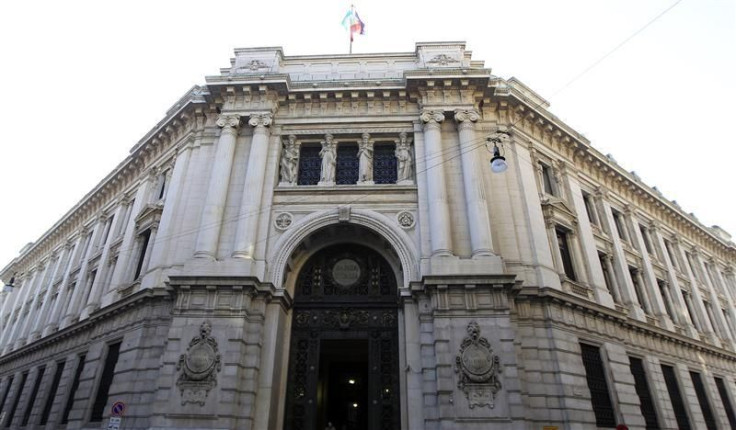Italian Banks Primed To Blow Up

Italian banks appear close to joining their Spanish counterparts as the euro zone's latest contribution to the financial world's endangered species list.
In the first three months of this year, Italians who held deposits in their country's banks moved €274 billion ($344 billion) to northern European countries, according to the nation's central bank. That's up sharply from the €200 billion they moved during the volatile fourth quarter of 2011.
At the same time as Italian banks were seeing billions walk out the door for points north, they've gone on a bond-buying spree, taking tens of billions of dollars in debt off the hands of foreign banks while also loading up on new issuances.
So far, the market has assumed the Italian banks, even with their seemingly insatiable appetite for local paper, were only taking prudent advantage of a good arbitrage opportunity, buying bonds that yielded close to 7 percent in interest using the hundreds of billions of euros in 1 percent-interest financing recently provided by the European Central Bank as part of its Long-Term Refinancing Operation.
But it now appears the banks have gorged on too much of a good thing, buying up so much debt that, when the capital flight is also taken into account, they find themselves with less money than when the ECB's extraordinarily cheap loans program started in December. Connecticut-based hedge fund Bridgewater Associates estimates Italian banks have spent €48 billion more than they've received in ECB money since December.
No one has admitted as much, but the capital crunch now faced by Italian banks has been obvious in at least one statistic: April purchases of government bonds by Italian financiers dropped sharply to just €6.62 billion. The sudden satiation of their local banks' appetite augurs big problems for Rome, which has €228 billion in further issuance planned for 2012.
But an acknowledgement by the institutions themselves that they are having such deep capital shortfalls would be even more of an issue. Already, investors distrustful of the health of Italian banks left giants UniCredit and Intesa Sanpaolo high and dry earlier in the month, as new shares of both companies floated in the London Stock Exchange fell during their first day of trading.
Credit rating agencies, meanwhile, have not been kind to Italian banks this past month, with Moody's downgrading 26 banks on May 14 and Standard & Poor's issuing a report a few days later warning that Banca Monte dei Paschi di Siena, Intesa Sanpaolo and UniCredit are among the most likely to suffer due to the euro zone's sovereign debt crisis.
It's all redolent of banks in Spain. David Mackie, chief economist at JPMorgan Chase & Co. in London, wrote in a note that a European Union and International Monetary Fund bailout package for Spain covering the government's gross funding needs through the end of 2014, and including €75 billion to recapitalize banks, would amount to about €350 billion, according to Bloomberg News.
Not to worry, say Italian bank executives. On May 27, for example, Banca Monte dei Paschi chairman Alessandro Profumo told a weekend TV interviewer that Italian banks didn't have true capital shortfalls, as those would be made up as long as the Italian government did not default on its debt.
Italian banks hold lots of Italian sovereign bonds that some think they will not be repaid, but if they'll are repaid, then banks are solid, Profumo said in the interview.
That assumes Italy, which said last week it expects a contraction of 1.5 percent of its GDP in 2012, will not follow Spain, Greece, Portugal and Ireland into the path of illiquidity and insolvency.
Not that Profumo doesn't have other things to worry about. The financier, who used to be chief executive at rival UniCredit, was summoned Tuesday by a Milan judge on charges he and 19 other bankers executed and covered up a complex tax evasion scheme with the help of British giant Barclays PLC. He released a statement following the criminal indictment stating he was looking forward to the trial, as it would allow him to shake off the reputational damage which I am de facto, though unjustly, suffering.
© Copyright IBTimes 2024. All rights reserved.





















